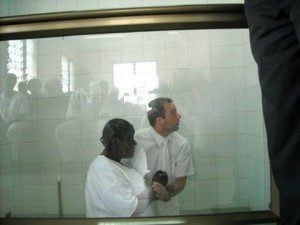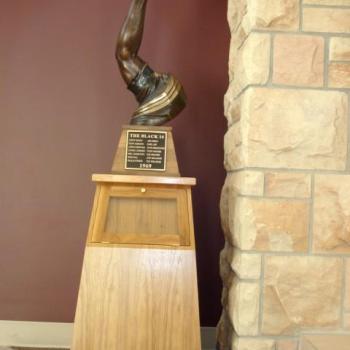Fourth grade can be terrible. Not only do you get introduced to hard math, but all the kids start experimenting with identity and control. In my fourth grade class, a particular girl was in charge. Of everything. If she liked you, she would call you to tell you what color of dress to wear. (Yes, this was in the days when girls always wore dresses.) Sometimes, she would test your loyalty. She did this to my classmate, Laurie. She told Laurie to twist Barbara Hatch’s arm. We were all at recess. Laurie, who was always gentle and a bit shy, stood at this peak moment of her childhood, debating the consequences of obeying or of not obeying. Finally, realizing how consequential it would be to not obey, she walked up to Barbara and twisted her arm. It made Barbara cry. Laurie spent the rest of the day contemplating the evil she had just entered–for any act of inhumanity is evil in a child’s world. She did not listen to our teacher’s lessons, but vowed and even wrote over and over again: “I will never hurt anyone again. No matter who tells me to.”
Some thirty-five years ago, I was at the height of my intellectual pride and easy cynicism. I said something that hurt my sister. I have no memory of what I said, just of the piercing realization that I had hurt her. The wounded look on her face haunted me, and I promised myself that I would never hurt my sister again. I have kept that promise. My sister and I will have a sleepover at my parents’ place this weekend and just talk. We love each other.
I talked to my dad about death last week. I repeated what I have long held–that mortality is nursery school where we learn only a few truly important lessons: how to repent, how to forgive, and how to love. Dad and I talked about many of our friends and family members who had short lives. My grandfather died at age fifty-one. My best friend was forty-one. Dad’s sister was forty-two. I told Dad that the spans of our lives won’t ultimately matter much. We will look back at what we have done, what we have experienced–every taste, smell, sight, sound and touch,–how we have shared our lives and our legacies (however brief), and we’ll say, “Oh my! That was amazing!” It may seem that we are doing terribly important things as we get advanced degrees and work in various causes–and we often are–but these causes will not measure our life’s worth. The great causes will continue with others at the helm long after our bodies have decayed and our names been largely forgotten. The lives we have touched, and which we’ve allowed to touch ours, will be our contribution to the experience of human life on this planet, where generation after generation will work to make things better–sometimes interrupting the progress to make things worse in the name of making them better. I have always imagined that in a world to come, we will be able to feel each other’s histories without any exchange of words. Sometimes, we can do that even now. My deepest religious beliefs tell me that I am on only the first rung of a tall ladder.
Though Joseph Smith’s “King Follett Discourse” clearly informs that last statement, I should say that my choice to be LDS provides my religious frame, but it is not the whole of my religion. My real religion is expressed in Galations 5:6:
For in Jesus Christ neither circumcision availeth any thing, nor uncircumcision; but faith which worketh by love.
Faith leads to love, and love consummates faith. Not much else matters. At the end of our lives, the outward signs of our religion have little significance except as reminders of how we honored and purified our faith through magnifying and manifesting our love.
So, with all of this as context, let me explain why I will not be participating in the “third conversation” on approaches to feminism on Mormon Stories. Representatives of “Ordain Women” explained their position. Fiona Givens, Maxine Hanks, Neylan McBaine and I explained ours. Comments after the podcast led to accusation, division, and name-calling. Since I have found myself, to my utter embarrassment, falling into anger and responding unkindly to some who differed with me, and since I look carefully at what various environments will include (for good or ill), I have chosen not to enter into what may well become the chaos of contention. Though I have entered previously, I choose not to enter again. In fact, it is my vow that I will never again go into places where I might be tempted to say disrespectful words or to let my power to love wilt in the echo chamber of argument. I will not enter any place where I might temporarily forget that if I honor human dignity, I must not let pride rule my words. I said publicly that I could not participate because I am focusing on my father. That is true. But it’s an incomplete answer. I cannot afford to lose the spirit of love when I am being given the honor of ministering to my dad. I cannot entertain contention–not even the possibility of it–and then perform ordinances in the temple. Contention taints the soul. Contention tempts us to listen only to find the points we can attack, and to pack our words with barbs that will ignite anger. It is not God’s way. Nor is it the way of the “divine feminine.” It is not consistent with my true religion, and I cannot give up my spiritual strength–even my priesthood strength–to indulge in it.
My religion is better expressed in loving talks with my siblings than in any lessons I teach. I am living my religion when I hold one of my children who is grieving or panicking, or when I simply sit with a friend. I am at peace with the universe when I reach across the bed to hold my husband’s hand. I am living my religion when I anoint my father’s feet with oil and rub them, an act I consider sacred.
The picture I have included on this blog post shows Jared Wigginton and Carmela. It is one of my two favorite pictures from the years when I wrote to missionaries in the Congo. (I still write to missionaries, btw.) The picture is all a mirrored reflection, and the audience looks ghostly, as if souls from the past or from the future were watching this brief and holy moment. Many of our moments can be holy, and might well be witnessed by those (seen and unseen) who will feel the effects. And of course, many of our moments can be unholy and likewise affect those we see and those we don’t.
I believe that when I die, I will remember a few scenes from my childhood and beyond. I will remember my baptism. I was the first, after all, to be baptized in the brand new Bloomington, Indiana LDS church. I will recall my years as a desperately insecure but dangerously articulate debater in high school. I will remember my first marriage with compassion for my ex-husband, who simply wasn’t ready for all that our brief union would require. I will remember the day I looked across the altar at Bruce and said, “Yes.” And I will remember each of those peak moments in my life when I brought a baby into the world, and when I stood by as my grandchildren were born. I plan on telling my Savior that I kept my promises, and that mortality was “an amazing experience.”
Those “peak moments” seem to be consistent with traditional female roles, though they are also peak moments for men. But, you might wonder, shouldn’t somebody at least mention that I did books, films, and firesides on black Latter-day Saints? That I got awards for my teaching? That the state of Utah gave me a medal for my writing? That I raised money for the great film Heart of Africa?
I’ll let C.S. Lewis answer with the example of another woman: Sarah Smith, from The Great Divorce:
“It’s someone ye’ll never have heard of. Her name on earth was Sarah Smith and she lived at Golders Green.”
“She seems to be…well, a person of particular importance?”
“Aye. She is one of the great ones. Ye have heard that fame in this country and fame on Earth are two quite different things.”
“And who are all these young men and women on each side?”
“They are her sons and daughters.”
“She must have had a very large family, Sir.”
“Every young man or boy that met her became her son – even if it was only the boy that brought the meat to her back door. Every girl that met her was her daughter.”
[H]e said, “It is like when you throw a stone into a pool, and the concentric waves spread out further and further. Who knows where it will end? Redeemed humanity is still young, it has hardly come to its full strength. But already there is joy enough in the little finger of a great saint such as yonder lady to waken all the dead things of the universe into life.”













